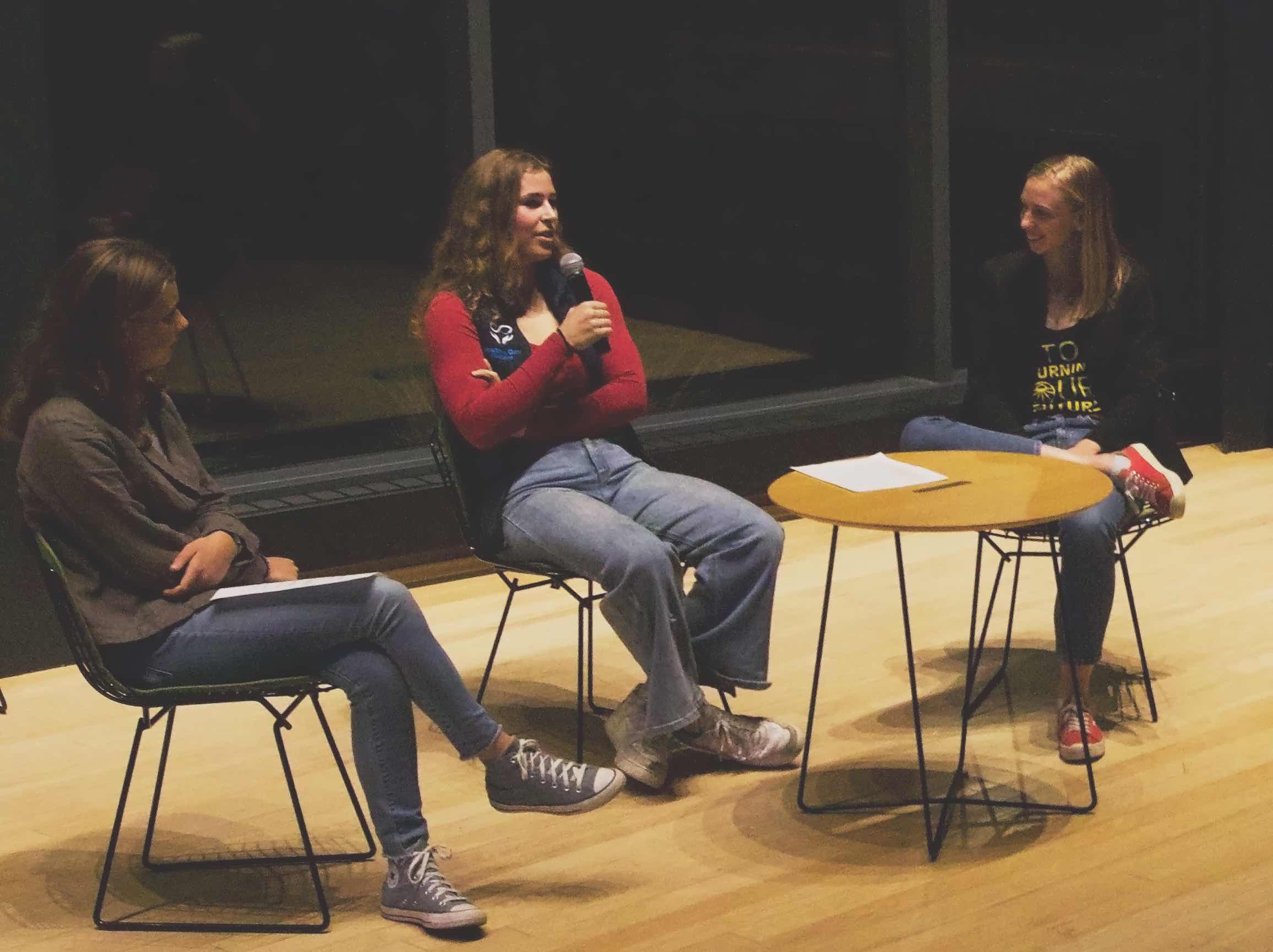Youth climate activists reflect on climate crisis
October 20, 2023
 Isa Cruz
Isa CruzAs a senior in high school, Georgi Fischer wrote a letter to the editor of her local newspaper about how climate change had damaged the environment she trained in as a cross country skier. As she hopped over patches of grass instead of moguls of snow in Bozeman, Montana, she’d grown concerned about the lack of snow in a northern state in late December. Unbeknownst to her then, the letter would lead her to be a plaintiff in a lawsuit that would shape the future of energy policy in her state. Fischer came to Bowdoin on Tuesday to discuss her role in the lawsuit, Held v. Montana,
and in youth climate activism, alongside deputy campaign manager Lucy Hochschartner of OurPower, to offer perspectives about the Pine Tree Power ballot amendment. Tuesday’s event, which took place in the Roux Center for the Environment, gathered young supporters of the amendment to generate support leading up to the November 7 election.
The proposed Pine Tree Power ballet amendment would create a publicly owned power utility governed by an elected body of officials. To create a publicly owned power utility, the state would have to buy Central Maine Power and Versant Power, the two largest power utility companies in the state.
Now a senior at the University of New Hampshire, Fischer discussed how she became involved in the landmark case, in which she and 15 other young climate activists sued Montana, arguing that the state’s failure to consider climate impacts when reviewing fossil fuel projects was unconstitutional.
Hochschartner said that Fischer’s lawsuit and the Pine Tree Power referendum are part of a wider series of youth climate activism across the nation. Others in the audience expressed the same sentiment. Bath resident Frederick Lancaster attended the event because he admired the work of Fischer as a young leader in the climate movement and wanted to meet her.
“I have great respect and admiration for the people that filed this suit that were the plaintiffs in Montana,” Lancaster said. “And I had to see in person one of the faces who was behind that effort in person.”
Fischer stressed that one of the reasons she devotes her career to addressing the climate crisis is that she knows if left unaddressed, her generation will be the one to face the impacts.
“The youth are going to be disproportionately affected by the climate crisis. We already are growing up through the climate crisis and seeing physical impacts of it. It has been hard just not knowing what the future will hold, and that has had a lot of impact on my mental health,” Fischer said.
Hochschartner emphasized how emotionally draining working in the climate movement can be for young people.
“[I] was really just struck by how much more emotionally draining it was for folks who were five years younger than me,” Hochschartner said. “You don’t necessarily have the emotional tools that you have when you’re older to deal with some of those feelings.”
Hochschartner explained that part of the pressure young people feel comes from the fact that they feel they need to solve the climate crisis immediately and on their own.
“I think it’s important to not get trapped in the urgency. But as long as you keep that ball rolling, you can build momentum which does lead to change,” Hochshartner said.
While Hochschartner stressed the need for understanding one person’s role in a global crisis, Bowdoin Sunrise Co-leader Owen Gramley ’25 thinks Bowdoin students could do more collectively.
“I think that people could be more involved, especially with local Maine politics like hydropower, like the Pine Tree Power amendment. We could have more volunteering for local organizations, more working for campaigns, getting involved in the town council [and] getting involved with clubs on campus,” Gramley said.
However, Fischer emphasized the need for balance in personal life and climate activism, especially for college students juggling many other commitments.
“Balance is really important. And also just being aware of what’s going on in the place or places around you and the places you love, and just making a positive change there,” Fischer said. “But I think taking a step back for young people and joining an organization is really important.… Finding your role and what you can do to help within your own boundaries is really important [in keeping that] balance.”
Gramley recognized the importance of balance but also expressed why students must recognize the climate crisis as an essential part of our lives.
“People are just very busy. I understand that. But also, the time of the climate crisis doesn’t really care about your midterm.” Gramley said. “I’m saying people don’t think of the urgency of the climate crisis. I think in some sense, the climate crisis can’t be superseded by all the different activities people do on campus.”
With less than two-and-a-half weeks until the election, Hochschartner is optimistic that Pine Tree Power can attract a broad base of support to transform Maine’s energy and climate landscape.
“Most people are pretty polarized. Things are relatively decided far before election day. That is not the case with Pine Tree Power,” Hochschartner said. “People really want to learn about what this actually does, which is, rather than renting the grid from a foreign corporation, we can open ourselves and receive savings, reduce outages and bring back control for our communities [to] make sure that we’re able to transition to clean energy. So that’s the word we need to be spreading.”

Comments
Before submitting a comment, please review our comment policy. Some key points from the policy: